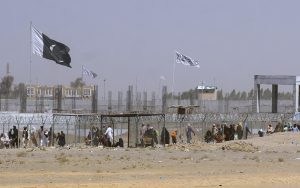Pakistan has decided against going it alone with regard to extending recognition to the Taliban as Afghanistan’s legitimate government.
It would take a decision on the matter “in consultation with regional and international powers, especially China, Turkey and the United States of America,” Minister for Information and Broadcasting Fawad Chaudhry said at a recent media briefing,
While it has not officially announced a government yet, the Taliban, which captured Kabul on August 15, have been quietly appointing their leaders to different administrative and political offices in the country.
The Pakistan government’s statement relating to recognition of the Taliban regime is significant, not only because it is one of the closest allies of the Taliban in the region, but also because it indicates that Islamabad has its own apprehensions over Taliban rule.
When the Taliban first came to power in Afghanistan in 1996, Pakistan was among the first countries to recognize their government. So why has Pakistan adopted a cautious approach now on the question of recognizing the Taliban?
Pakistani policymakers are aware that extending legitimacy to the Taliban regime when other countries in the region or beyond have not done so could leave Islamabad isolated. It is likely that Pakistan is keen to send a message to the United States that it would go along with the international community’s decision with regard to recognizing the Taliban regime.
The criticism that the Biden administration is facing back home on account of the Taliban’s capture of power in Kabul has put Washington and Islamabad on a collision course. For Pakistan and the U.S., it was important to end up on the same side after the completion of the withdrawal of American forces from Afghanistan. However, this has not happened. Instead, a new evacuation crisis has emerged, which is likely to deepen in the coming days as the Taliban have asked the international troops to leave the country by the end of August.
Once the U.S. troops complete their withdrawal from Afghanistan, Washington is likely to penalize Islamabad for its inability to offer a solution in Afghanistan.
Another possible explanation could be related to Pakistan’s concerns with the Tehrik-i-Taliban Pakistan (TTP), which is believed to have sanctuaries in Afghanistan. Pakistan has reportedly shared a list of TTP leaders and fighters who operate from Afghanistan with the Taliban chief, Haibatullah Akhundzada. Pakistan expects the Taliban to take action against anti-Pakistan militants, including Baloch insurgent groups based in Afghanistan. Islamabad may not recognize the Taliban regime until the group takes action against the TTP and other groups.
So far, all developments indicate that the Taliban may not do what Pakistan expects the group to do. Last week, it released scores of TTP fighters from Afghan prisons.
The Voice of America reported last week that the Taliban have formed “a high-powered commission” to press “anti-Pakistan militants to stop violence against the neighboring country and return to their homes across the border with their families.” However, the Taliban have said that there are no Pakistani Taliban fighters in Afghanistan. The group’s spokesperson also rejected reports that it had formed a committee to address Pakistan’s TTP-related concerns.
Some analysts have claimed that soon after Kabul fell to the Taliban, the TTP’s head, Mufti Noor Wali Mehsud, moved to the Afghan capital. Meanwhile, TTP attacks on Pakistani troops continue. Earlier this week, the group claimed responsibility for an IED attack targeting Pakistani army troops in the Zangara area of Ladha Tehsil in Pakistan’s South Waziristan Agency. The attack left one soldier dead and two others wounded.
These developments should worry Pakistan.
If the Taliban are saying that there are no TTP militants in Afghanistan, this essentially means that the group is not going to take action against the outfit or its fighters. This was the standard position that Pakistan took for years when it was asked to explain the Taliban’s presence on Pakistani soil. As it appears, the Taliban are preparing to protect the TTP, and do not plan to take action against the group.
The idea of an inclusive government in Afghanistan may also be on the minds of Pakistani policymakers as far as the question of recognizing the Taliban government is concerned. Pakistan has maintained that it is in favor of an inclusive political settlement, where the representation of all ethnic groups is ensured. Perhaps, Pakistan, like many other nations globally, will wait and see the Taliban’s actions when it comes to accommodating other ethnic groups in the incoming government.
So far, it looks like the Taliban are preparing to establish an Islamic Emirate, and may not accept leaders of other ethnic groups in its governing setup. If this happens, the Taliban should not expect recognition for their regime from countries in the region and beyond.
All this indicates that things are not looking good for Pakistan. The return of the Taliban to power in Kabul appears to have complicated Pakistan’s security woes. Pakistan’s relationship with countries like the U.S. may also take a hit, weakening Islamabad’s influence in Washington. On the other hand, if TTP-led attacks continue, for instance, on China’s projects in the country, Beijing and Islamabad’s bilateral relationship may also come under strain.
Like other countries, Pakistan too will hope for an inclusive Taliban government that will deny sanctuary to terrorists. At this stage, it is unclear what Pakistan may do if the Taliban continue to offer TTP sanctuaries in Afghanistan. But the issue certainly has the potential to fray ties between Islamabad and the Taliban.

































